
MICRO DEGREE
EV Power Electronics Specialist
EV Power Electronics & Motor Drives
100% LIVE Interactive Classes
EV Power Electronics & Motor Drives
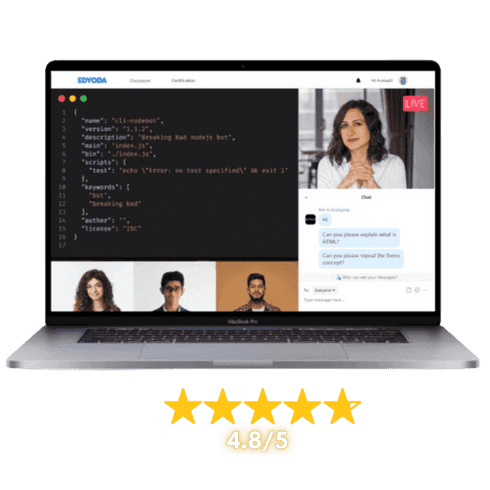
100% LIVE Interactive Classes
Reserve your spot today!
Basic Info
Select Offers
Application closes on:11 Feb 2026
Get instant access of pre-course material!
Talk to Us
We’re here to help! Reach us at:
What is in it for you?
Shape the future with EV Power Electronics Specialist
 100% Live Classes
100% Live Classes
 Instructor-led Live Sessions
Instructor-led Live Sessions
Attend 4 weeks of instructor led live classes from the top 1% industry experts
Projects & Case Studies
Projects & Case Studies
Gain hands-on experience with projects and real-world case studies for impactful learning
Verified Certificate
Verified Certificate
Earn a industry recognized certificate and kick start your career
Session Recordings
Session Recordings
Revisit older chapters anytime with recorded sessions
Flexible Schedule
Flexible Schedule
Choose live classes from different cohorts that fit your availability.
Study Materials
Study Materials
Access comprehensive study materials designed to enhance your learning experience
100% Moneyback Guarantee
Grab your slot before the offer expires
Discount applicable for next 10 candidates only.
Reserve your spot today!
Basic Info
Select Offers
Application closes on:11 Feb 2026
Get instant access of pre-course material!
Talk to Us
We’re here to help! Reach us at:
Learn from Top 1%
Sr. Managers, VPs, CXOs, Directors & Founders from companies shaping the future.

Combo Offers
Create Your Own Combo
100% Moneyback Guarantee
Available in 4 monthly installments at $106/month
Reserve your spot today!
Curriculum
A Curriculum designed for your success
Live Sessions Schedule ![]() Sat - Sun (Weekends Only)
Sat - Sun (Weekends Only) ![]() Timing 7:00 AM - 9:00 AM / 8:30 AM - 10:30 AM / 11:00 AM - 1:00 PM / 5:00 PM - 7:00 PM / 7:30 PM - 9:30 PM EST
Timing 7:00 AM - 9:00 AM / 8:30 AM - 10:30 AM / 11:00 AM - 1:00 PM / 5:00 PM - 7:00 PM / 7:30 PM - 9:30 PM EST
- Understanding the role of power electronics in EV propulsion systems
- Overview of EV subsystems: inverter, DC-DC converter, on-board charger, and motor drive
- Energy flow and powertrain efficiency mapping
- Comparing ICE vs EV powertrain architectures
- Hands-on: Visualize EV power flow using MATLAB Simscape Power Systems
- Fundamentals of semiconductor switching devices: diodes, MOSFETs, and IGBTs
- Emerging wide bandgap devices: SiC and GaN for EV applications
- Switching losses, thermal management, and efficiency optimization
- Gate driver design principles and protection mechanisms
- Hands-on: Analyze MOSFET switching characteristics using LTSpice or MATLAB
- Principles of buck, boost, and bidirectional DC-DC converters
- High-voltage to low-voltage power conversion in EVs
- On-board charger architecture and control strategies
- Battery charging standards: AC Level 1/2, DC fast charging, CHAdeMO, CCS
- Hands-on: Simulate a bidirectional DC-DC converter circuit in MATLAB Simulink
- Three-phase inverter design and modulation techniques (PWM, SVPWM)
- Voltage source vs current source inverters
- Inverter efficiency, switching frequency trade-offs, and EMI considerations
- Introduction to motor control strategies for EV applications
- Hands-on: Implement a three-phase inverter in Simulink for an induction motor
- Overview of EV motor types: DC, BLDC, PMSM, Induction, and Switched Reluctance Motors
- Comparing torque-speed characteristics and efficiency profiles
- Motor sizing and selection criteria for different EV segments
- Understanding motor parameters: back-EMF, torque ripple, and cogging
- Hands-on: Compare BLDC and PMSM performance curves in MATLAB
- Principles of open-loop and closed-loop control in EV drives
- Field-Oriented Control (FOC) and Direct Torque Control (DTC) algorithms
- Rotor position sensing and sensorless control methods
- Real-time control implementation on microcontrollers and DSPs
- Hands-on: Simulate a Field-Oriented Control (FOC) algorithm for PMSM in MATLAB
- Principles of regenerative braking in electric vehicles
- Power flow and converter operation during braking
- Control strategies for smooth energy recovery
- Integration of braking with traction control and ABS systems
- Hands-on: Model a regenerative braking scenario in MATLAB using drive cycle data
- Heat generation and dissipation in inverters and converters
- Thermal modeling of IGBTs and MOSFETs
- Design of heatsinks and cooling systems
- Reliability factors and lifetime prediction of power modules
- Hands-on: Analyze thermal performance using MATLAB thermal model blocks
- Overview of microcontrollers and DSPs used in EV drives (TI C2000, Infineon, NXP)
- Signal conditioning, ADC sampling, and PWM generation
- Developing control firmware for inverter operation
- Real-time debugging, testing, and hardware-in-the-loop (HIL) simulation
- Hands-on: Design a basic motor control loop in MATLAB and deploy to a controller board
- SiC and GaN adoption in next-generation EV inverters and chargers
- High-voltage architectures: 800V systems and ultra-fast charging
- Wireless charging and bidirectional energy transfer (V2G, V2H)
- Integration of AI and digital twins in EV drive design
- Mini Project: Design an efficient inverter topology for a 100 kW electric powertrain
- Capstone Project: Design and simulate a complete EV inverter and motor drive system
- Analyze performance using standard drive cycles (NEDC, WLTP, FTP-75)
- Prepare project documentation and validation report
- Showcase project on professional portfolio platforms (LinkedIn, GitHub)
- Career roles: Power Electronics Engineer, Motor Control Engineer, EV Drive System Engineer
- Final mentor review and industry certification
Mentors
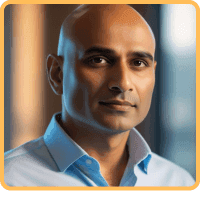
Dr. Sudhakar V
Sr. Design Engineer Tata Motors, 15+ Years

Ravi P
Sr Systems Manager, MG India, 12 Years
Course Includes

LIVE Interactive Sessions

Quizzes, Assignments & Projects

Study Materials & Session Recordings

Certificate
Course Includes

LIVE Interactive Sessions

Quizzes, Assignments & Projects

Study Materials & Session Recordings

Certificate
Course Pre-requisites
.ffb97545.png&w=16&q=75&dpl=dpl_4tU4cWUtptsa1UWx5y7Q2Uqi7fio) Basic electronics knowledge is required for this course.
Basic electronics knowledge is required for this course.
Outcomes
.ffb97545.png&w=16&q=75&dpl=dpl_4tU4cWUtptsa1UWx5y7Q2Uqi7fio) Design and simulate complete EV power electronic systems, including inverters and DC-DC converters, to manage efficient power flow between battery and motor.
Design and simulate complete EV power electronic systems, including inverters and DC-DC converters, to manage efficient power flow between battery and motor..ffb97545.png&w=16&q=75&dpl=dpl_4tU4cWUtptsa1UWx5y7Q2Uqi7fio) Master semiconductor switching using MOSFETs, IGBTs, SiC, and GaN devices to build high-efficiency, compact, and reliable EV drive systems.
Master semiconductor switching using MOSFETs, IGBTs, SiC, and GaN devices to build high-efficiency, compact, and reliable EV drive systems..ffb97545.png&w=16&q=75&dpl=dpl_4tU4cWUtptsa1UWx5y7Q2Uqi7fio) Implement and tune three-phase inverter control techniques such as PWM, SVPWM, and Field-Oriented Control (FOC) for BLDC and PMSM motors.
Implement and tune three-phase inverter control techniques such as PWM, SVPWM, and Field-Oriented Control (FOC) for BLDC and PMSM motors..ffb97545.png&w=16&q=75&dpl=dpl_4tU4cWUtptsa1UWx5y7Q2Uqi7fio) Analyze and optimize motor drive performance by selecting the right motor type, control strategy, and inverter topology for EV applications.
Analyze and optimize motor drive performance by selecting the right motor type, control strategy, and inverter topology for EV applications..ffb97545.png&w=16&q=75&dpl=dpl_4tU4cWUtptsa1UWx5y7Q2Uqi7fio) Simulate regenerative braking and energy recovery systems to enhance EV energy efficiency and extend driving range.
Simulate regenerative braking and energy recovery systems to enhance EV energy efficiency and extend driving range..ffb97545.png&w=16&q=75&dpl=dpl_4tU4cWUtptsa1UWx5y7Q2Uqi7fio) Develop embedded control firmware for EV drive units using real-time microcontroller or DSP platforms like TI C2000 and Infineon.
Develop embedded control firmware for EV drive units using real-time microcontroller or DSP platforms like TI C2000 and Infineon.
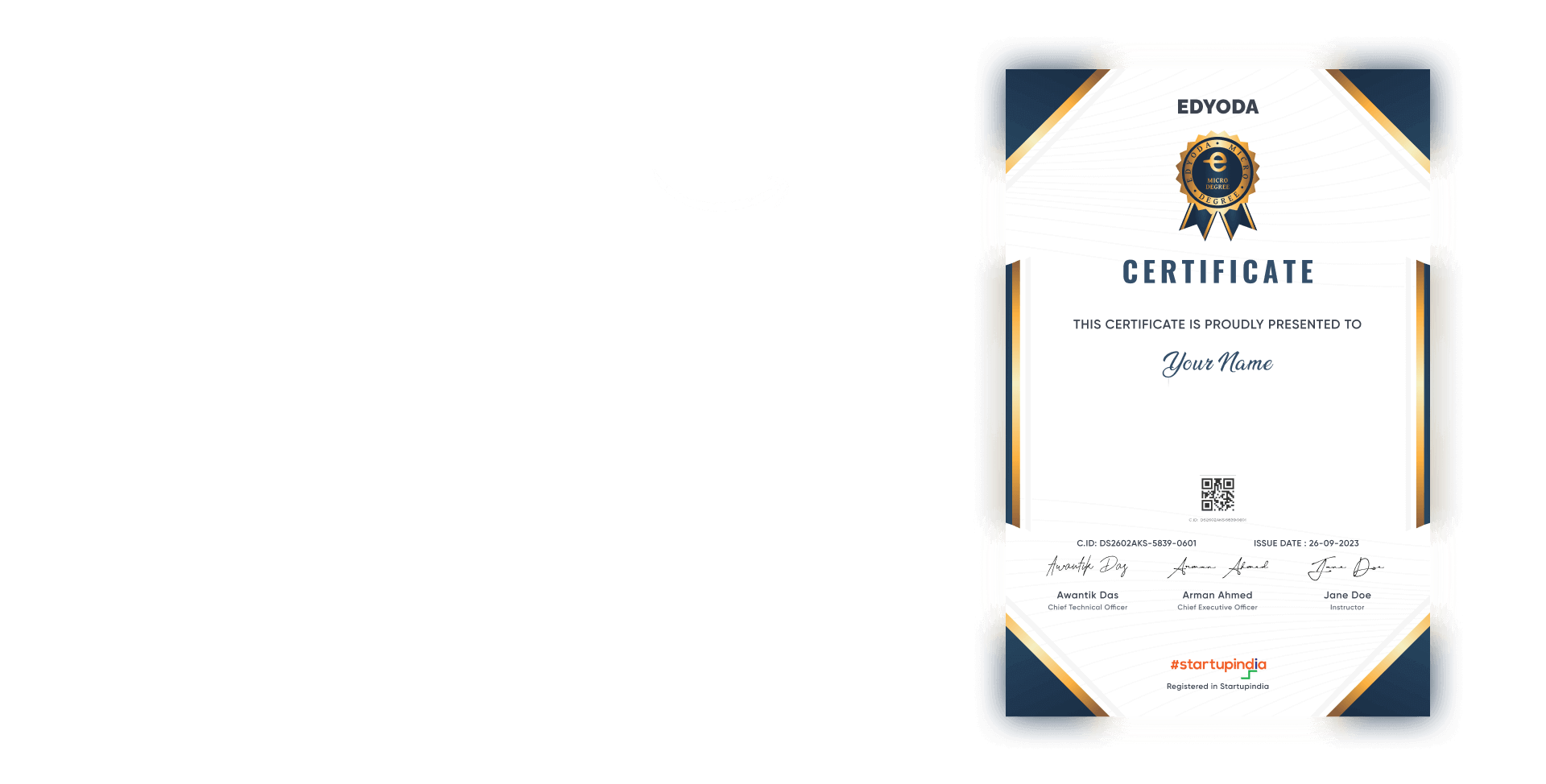
for successfully completing the 'EV Power Electronics Specialist' course conducted from 30 Dec 2025 to 10 Feb 2026
Add a Industry Recognized
Certificate To Your Resume
Industry Recognized
Certificate
Learn the best from the best

Career Advancements
Elevate your career with a respected certificate

Industry Respect
Gain credibility in the field

Networking
Connect with experts and peers

Opportunities
Attract exciting job prospects and promotions

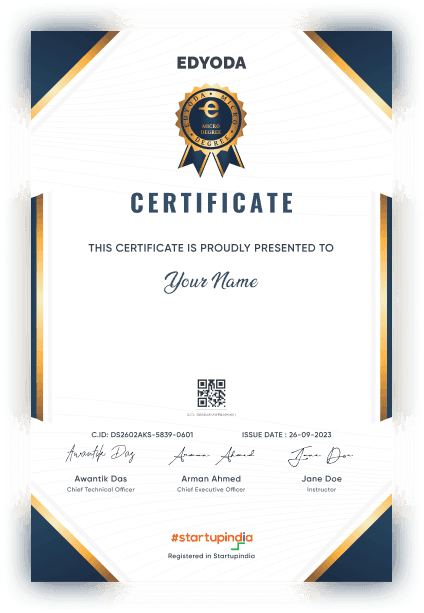
for successfully completing the 'EV Power Electronics Specialist' course conducted from 30 Dec 2025 to 10 Feb 2026

100% Moneyback Guarantee
Top 1% Recruiters - Get interview access to 550+ Companies

Recommendations
Hear from our Learners



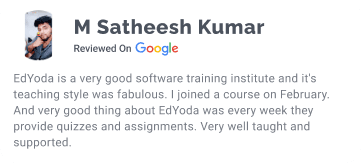




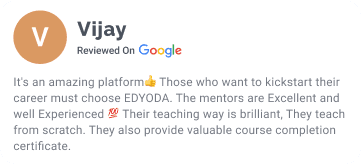







Looking for help? Here are our most frequently asked questions
What is a EdYoda Micro Degree?
EdYoda Micro Degree is an online, Live classroom based short-term course, where you get Live Sessions conducted by industry experts. It is designed to help you acquire practical & job-relevant skills quickly.
How do I register for the micro degree?
To register, visit the micro degree details page and fill up the registration form and make the payment to reserve your seat before the application closing date.
What happens after I register and pay?
After successful registration and payment, you will receive a confirmation email with instructions on how to access the online micro degree classes
Are there any pre-requisites?
All you need is a PC or Laptop to attend the online live classes and your commitment of 4 weeks. Apart from that there are no prerequisite for the Micro Degree.
What if I miss a live session?
We've got you covered! The session recording will be added automatically on the classroom platform after the session is ended.
Will I get a certificate after completion?
Yes. After successful completion of curriculum you will be provided a digital certificate which you can download and share with others.

What is a EdYoda Micro Degree?
EdYoda Micro Degree is an online, Live classroom based short-term course, where you get Live Sessions conducted by industry experts. It is designed to help you acquire practical & job-relevant skills quickly.

How do I register for the micro degree?
To register, visit the micro degree details page and fill up the registration form and make the payment to reserve your seat before the application closing date.

What happens after I register and pay?
After successful registration and payment, you will receive a confirmation email with instructions on how to access the online micro degree classes

Are there any pre-requisites?
All you need is a PC or Laptop to attend the online live classes and your commitment of 4 weeks. Apart from that there are no prerequisite for the Micro Degree.

What if I miss a live session?
We've got you covered! The session recording will be added automatically on the classroom platform after the session is ended.

Will I get a certificate after completion?
Yes. After successful completion of curriculum you will be provided a digital certificate which you can download and share with others.
General FAQs
Everything you need to know













